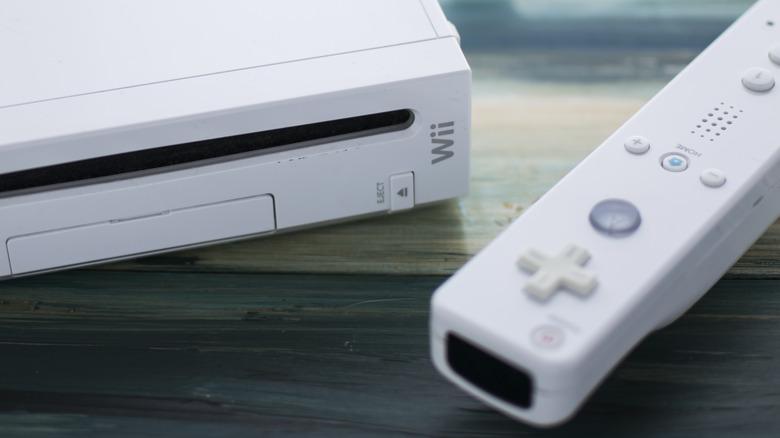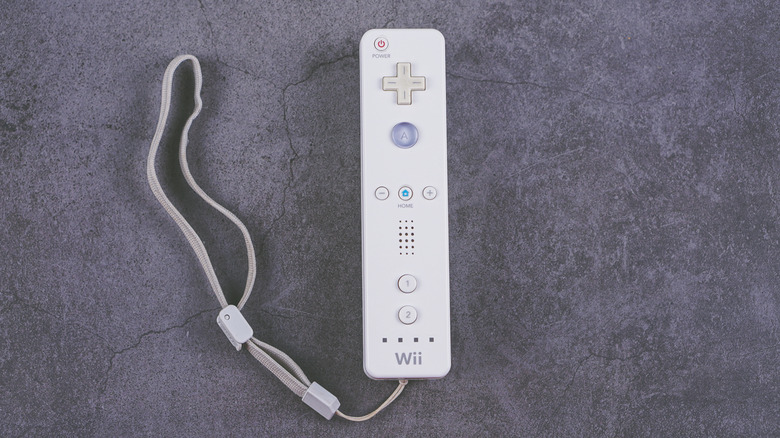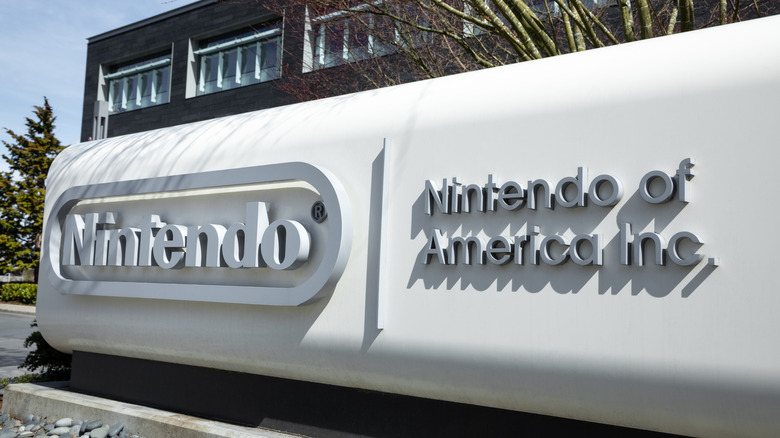Why Multiple Companies Sued Nintendo Over The Wii
Remember the class action lawsuits against Nintendo over the Joy-Con drift issue? While Nintendo finally acknowledged the problem and apologized to Switch owners in 2020, it didn't stop the lawsuits from piling up. Over five years after releasing the console, Nintendo continues to deal with legal action on the matter, with another potential lawsuit returning to the spotlight as recently as March 2022 (per Axios). Though Nintendo's Toru Yamashita revealed that newer Joy-Cons feature improved components, including those packaged with the OLED model, it looks like the company might be fielding this issue in court for a while.
This is far from Nintendo's first legal kerfuffle over a massively popular console. As chronicled by Slate, the company came out on top of the seventh console generation with the Nintendo Wii's unique design and industry-first successful implementation of motion controls. While this was a big win for Nintendo, these innovations attracted a great deal of attention from the tech world at large. After releasing the Wii in 2006, Nintendo found itself fighting off multiple patent-related lawsuits over the design of the Wiimote.
Everyone wanted a piece of the Wiimote
Unlike the concerns about the Joy-Cons' longevity, the lawsuits about the Wii Remote had more to do with its design patent. From 2008 to as recently as 2020, Nintendo has fought at least eight patent claims for the Wii Remote or its accessories and upgrades, most of which concluded in Nintendo's favor. The bulk of the patent claims surrounded the motion-tracking technology in the Wiimote, and came from firms representing tech companies Hillcrest Laboratories. As reported by Next TV, Hillcrest's 2008 suit was one of the few that ended in settlement instead of dismissal. Others focused on accessories, as was the case with Triton's filing against the Wii MotionPlus accessory that was dismissed in 2013 (per GeekWire).
The other six notable lawsuits included a 2008 claim by Motiva over a motion-sensitive fitness device (via GamesIndustry.biz); a 2013 claim from Creative Kingdoms, a theme park operator with a patent for a motion-controlled "magic wand" used in certain attractions (as reported by Bloomberg); a 2011 suit from ThinkOptics with patents for its Wavit remote (via Techdirt); another suit in 2011 from UltimatePointer alleging Nintendo had infringed on its Upoint product (per Techdirt); a 2013 suit from iLife Technologies that initially resulted in a loss for Nintendo, but was overturned in 2017 (via GamesIndustry.biz); and a 2020 suit from Genuine Enabling Tech (GET) that targeted both the Wii and the Switch before being dismissed (covered by Patent Arcade).
Multiple parties point towards patent trolling
While publications like VentureBeat, FindLaw, and NintendoSoup have painted plaintiff companies as "patent trolls," not all of them strictly meet the technical definition: a non-practicing entity that hoards patents for the sole purpose of litigation profits with no intention to develop them into working technology (as defined by Cornell Law School). Still, even the courts expressed that many of these suits were unscrupulous.
According to FindLaw, UltimatePointer's claims were described as "vexatious and wanton" conduct after it tried to overturn the initial ruling in 2016. Motiva, which took Nintendo back to court in 2012 and 2013 over the same two patents it claimed in 2008, was called out by the Court of Appeals for looking forward to "financial gains" from the litigation instead of genuinely attempting to protect and sell its technology (per GamesIndustry.biz). In the case of ThinkOptic, Techdirt pointed out that the company didn't apply for its related patents until 2005 — the same year that Nintendo revealed the Wii to the world after having already developed the majority of it.
Lawsuits regarding its other products aside, Nintendo's track record for defending the Wii in court is quite extensive. Unfortunately for the gaming giant, legal troubles over the Wii aren't over quite yet despite the console itself being over a decade old. According to Reuters, the 2020 GET suit has been revived, and it remains to be seen if the Wii's court record will remain undefeated.



